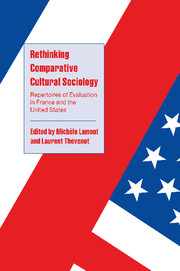Book contents
- Frontmatter
- Contents
- Notes on contributors
- Acknowledgements
- 1 Introduction: toward a renewed comparative cultural sociology
- Part I Race, gender, and multiculturalism
- Part II The cultural sphere: publishing, journalism, and the arts
- Part III Political cultures and practices
- 8 Community and civic culture: the Rotary Club in France and the United States
- 9 Forms of valuing nature: arguments and modes of justification in French and American environmental disputes
- 10 Comparing models of strategy, interests, and the public good in French and American environmental disputes
- Conclusion: Exploring the French and the American polity
- References
- Index
9 - Forms of valuing nature: arguments and modes of justification in French and American environmental disputes
Published online by Cambridge University Press: 26 March 2010
- Frontmatter
- Contents
- Notes on contributors
- Acknowledgements
- 1 Introduction: toward a renewed comparative cultural sociology
- Part I Race, gender, and multiculturalism
- Part II The cultural sphere: publishing, journalism, and the arts
- Part III Political cultures and practices
- 8 Community and civic culture: the Rotary Club in France and the United States
- 9 Forms of valuing nature: arguments and modes of justification in French and American environmental disputes
- 10 Comparing models of strategy, interests, and the public good in French and American environmental disputes
- Conclusion: Exploring the French and the American polity
- References
- Index
Summary
This chapter and the next compare political practice and culture in the United States and France through detailed analyses of specific environmental conflicts in each country. We study comparative politics as enacted in a range of public arenas and sites of conflict, but rooted in local participation and particular controversies, rather than focusing on specialized political institutions or actors. In carrying out such a broad comparison of political culture and practices through specific case studies, we need to avoid the risk of merely reinforcing macro stereotypes of the two “cultures” and of looking for comparative evidence on only one level such as “discourse.” We do so by relying on precise analytical categories, which have been developed to account for the complex requirements of all actors in public disputes, and by analyzing both the arguments and the actions of a range of disputants in these particular cases. In this way, our approach to studying comparative politics can provide a precise analysis of the cultural models and practices found in political disputes in each country.
We compare primarily the claims and arguments made by the conflicting entities during the course of the two environmental disputes. And we take seriously the pragmatic requirements of making such claims in the public arena, including the necessity of providing a legitimate “justification” for an argument or evaluation (i.e. a reference to some kind of general interest or common good), the potential for similarly legitimate critiques and denunciations of these justifications, and the requirement of offering proof for the claims made.
- Type
- Chapter
- Information
- Rethinking Comparative Cultural SociologyRepertoires of Evaluation in France and the United States, pp. 229 - 272Publisher: Cambridge University PressPrint publication year: 2000
- 261
- Cited by

